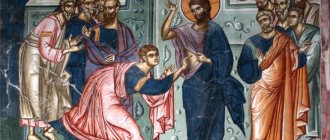There are many different ideas about faith. Lots of techniques and teachings. I won't go into them, I won't try to tell you what is good and what is bad. We will talk to you about what faith in God is. Let's see WHAT the Word of God says about her. I want to make an important point. We talk about what faith in general is on this page. Our priority now is to understand what FAITH IN GOD .
Faith in God is one of the beginnings of the teachings of Christ. Please note that these beginnings are called the FOUNDATION on which the path to perfection is built. Many people offer different ways to achieve excellence. Basically, it is the development of a person’s abilities, his capabilities.
The perfection of the believer is to be transformed into the image of Christ by dying to self. The task of the ministers appointed in the Church by Christ is that we come to the unity of faith, to a perfect man, to the measure of the full stature of Christ.
Dead faith
The Word tells us that demons also believe that God is one. But this faith CANNOT BE SUPPORTED by works. That's why she's dead. She is there, but she is dead. Like many people, there is faith, but it is dead because it does not produce works.
I will emphasize. You don't just have to do good things. It is faith in God that must carry out works. Eg.
You heard a person’s request and did a good deed for him. And the second option. You heard a prompting from God to do a good deed and, having listened to God, you did it. What is the difference? The point is that if there is no obedience and revelation, then you can ignore some requests at YOUR discretion. And having obedience, you will go to feed even the enemy.
You can have 10,000 in your wallet and give 500 to someone in need, based on YOUR reasoning. And obeying the voice of the Lord, give as much as you are told. When you hear a call from God to serve, you will accept it by faith, even if it does not correspond to what you studied for or prayed for. It will be a matter of faith. Or you can serve according to your “crust” or according to your abilities, doing good deeds in the same way.
In other words, faith in God implies certain deeds. I will emphasize - deeds that come from FAITH IN GOD. Not just “I want or I decided.” One of the most important confessions is “Jesus is Lord.” He is my Master.
Faith and how to get there
Each person considers it in relation to his own attitude towards religion:
- some are able to go to great lengths for the sake of the Almighty and comply with all requirements;
- others think that simply thinking about God sometimes is enough.
All this is very relative, but in the main tasks of church science there is a point that is aimed at interpreting it. We are more familiar with the concept of trust. We are able to rely on a person based on his actions, behavior and attitude towards us. The situation is the same with the Lord.
Quite often the question is asked about how to come to faith in God in Orthodoxy? It all depends on the person. But it is known for sure that this is a certain state that depends on the internal state of mind, which was determined by observations and inferences.
The best article for you, go to: How to be saved by the Orthodox in recent times
A person will have to believe in God without the opportunity to see Him. No one can say exactly how this feeling arises. Someone compares coming to faith in the Lord with some kind of secret meeting. We cannot be completely prepared for it. But there is an opinion that it descends on us precisely at the moment when we most need it.
The beginning of the teachings of Christ
Why is faith in God one of the important foundations on which our Christian life is built? Because this is where it all begins. Faith in God is the beginning of faith in SALVATION through Christ, in healing, in blessing. You cannot believe in the healing given to us through the sacrifice of Christ without realizing, without believing in God. Not living by the works of this faith. This fake was called “auto-training”, along with other philosophical methods.
It will simply be the belief that “everything will be fine.” As well as the belief that “I am good. And since I haven’t done anything wrong (unlike others), I will go to heaven.” At many funerals they say about the dead - may he rest in heaven.
Why would a person who has not lived as if God is real, that He exists, suddenly go to where the REAL GOD is present??
But faith in God implies renunciation of YOUR ideas and thoughts, from your life only because there is a God who must rule everything. Who is my Lord
Emotional response to prayer
Our brains form both reflective and non-reflective beliefs. In the first case, a person thinks and tries to find an explanation. When an unreflective belief occurs, there is no need to look for an explanation, but you just need to come to some kind of conclusion. In this case, the influence of religion is strong.
Astral projection: truth or myth? Mediums explain the phenomenon of leaving the body
Tested for generations: we make effective fertilizing for seedlings
A rose bush has dried to the ground: how to revive a flower after winter
This kind of thinking allows a person to understand the death of his loved one. After all, this is difficult for a person to accept. Often we tell stories about a deceased loved one as if they were nearby or still alive.
Abraham believed in God
What was Abraham's faith in God?
Abraham agreed to what he was told. And everything he did next was based on this faith. On the word that God spoke to him. In other words, looking at Abraham's works, we can say that he believed. If a person believes that a treasure is hidden in some area, then he will do everything to make this treasure his - he will buy this area, dig every day, and spend a lot of time and effort. His life and deeds will testify to his faith, his conviction that there is a treasure.
But!!! Abraham initially only had faith in God, which later led to works. And God saw this faith, and therefore considered Abraham justified. We further see Abraham’s mistakes, his doubts. But the main core was always there. And therefore, when God turned to him again, he did not reject Him.
Faith in our lives
It's the same in our lives. When we heard and believed in the sacrifice of Christ for us, we confessed our faith, calling on the name of the Lord. And in response, God gave birth to us again. And then, ANOTHER, NEW life began for us. Now, if we sin, we understand that we have done something displeasing in the eyes of God, and faith in His Son, the sacrifice for us, produces in us a confession of this sin. And, as a result, cleansing from all untruths.
Therefore, we accept water baptism, making a promise of a good conscience, agreeing that now our life must correspond to ANOTHER standard - the Word of God.
And this faith is counted as righteousness to us. We BECOME JUSTIFIED by faith in God. Then we accomplish our salvation, do works of faith, live by faith, and grow in it. Or, on the contrary, we are shipwrecked in faith, rejecting a good conscience , our responsibility before the Word of God for our actions. And we can no longer say that we believe in God, therefore we live and think as if He does not exist. We talk in more detail about faith in the Son on this page.
Conversations with the priest. What does it mean to believe in God?
Audio |
In the St. Petersburg studio of our TV channel, Archpriest Alexander Ryabkov, cleric of the Church of the Holy Great Martyr Demetrius of Thessaloniki in Kolomyagi, answers questions. The topic of today's program could be called children's, but in fact it unites us all.
The topic is: “What does it mean to believe in God?” Recently, on the street, I talked with a woman who was not yet looking in the direction of the temple, but she was concerned about many questions. We can say that she suggested this topic because she asked: “What does it mean to believe in God?” It turned out that this can and should be discussed. I will forward this woman’s question to you.
– Of course, the topic may seem very simple, even without any basis or relevance in our lives. But we must admit that we are simplifying this task that faces each of us. We must know and understand our faith. Firstly, faith is not limited to dogmatic truths, which every Christian also needs to know to one degree or another. The Apostle Paul tells us that we must always be able to give an answer about our hope, about our faith. We must know what we believe in, in Whom and how.
But, on the other hand, knowledge of dogmatic truths and the Catechism will not make us believers. In our soul, consciousness, heart, we can simplify the very content of faith, the very essence of communication with God. Why do we believe and call ourselves believing Christians?
And here it is necessary to recognize and sharpen the special feature that distinguishes Christianity from other religions, and especially not to simplify Christianity to paganism. Why do we go to church? Why do we attend Divine Liturgy on Sundays? Why do we pray or fast?
You can simplify everything to the primitiveness that prevails in pagan religions. Totemism, animism - when certain tribes or nationalities (before or even today) associate belief in some totem, ancestor, or in the fact that wind, water, fire are some kind of deities, associated with the desire to ask for earthly, primitive, simple success from these gods, spirits. Momentary, this-worldly success in hunting, fishing, trading.
Of course, we can go one step higher: and in paganism, the basis of belief in gods and spirits can be associated with the desire to achieve a posthumous good fate. It is interpreted differently in different religions. Perhaps somewhere there is a belief that the soul does not dissolve after death. She will stay somewhere, and after death she needs to reach her place of residence, improve it or prepare it.
If religion is associated with reincarnation, reincarnation, so that this reincarnation is better, more comfortable (if this word is appropriate here), then Christianity is not limited to these concepts, moods and even completely outgrows them. Although we must admit that these sentiments are one way or another found among Christians.
We come to church, light candles, or come to a prayer service to ask for primitive success: perhaps not in hunting (we are no longer hunters, gatherers, and maybe not even farmers), but in our careers, work, and studies. Outside of these questions, we don’t need God.
We come to the temple out of fear of what will happen to our soul after death. This fear of a mercenary or slave prevails over the filial feeling towards the Heavenly Father. But we understand that faith in God has the most important basis - a filial, selfless feeling, which is called love for the Heavenly Father.
Love is a feeling that is largely devalued in our relationships today (we also call some sinful relationships love). Let's transfer this concept to our public or personal relationships with a person: if we love someone, then we want to communicate with him, talk, hear, understand him, fulfill his desires and please him. We immediately remember that the saints were called saints of God.
And here we remember something else: there cannot be faith without works. According to the words of the Apostle James, faith without works is dead. But here, too, an amendment must be made. The question is not that we earn something for ourselves by doing. Deeds, especially for a holy person (although for an ordinary Christian, deeds are the product of his spiritual life) are not forced actions, under pressure, but the product of his mood, his aspiration towards God. Deeds are generated from the inner life, and not from above, they do not encrust our life externally. The question of faith, that it is manifested in deeds of good, should not be forgotten by us.
And here we are talking specifically about spirituality. Spirituality gives rise to deeds, and not vice versa: it is not deeds that give rise to spirituality. Although church discipline introduces us into some kind of framework, form, because without form there can be no religion. And here we go back to the beginning.
Our faith (or our entry into faith) is associated with baptism. We were all baptized: some as adults, many as children. We know, according to the word of the Gospel, the Lord Himself said that anyone who is not baptized with water and the Spirit will not enter the Kingdom of Heaven. Already with baptism our entry into spiritual life begins, but we understand that baptism is only the beginning, and then it’s up to the person himself.
– Question from a TV viewer: “It is known from theology that God is the Source of Life, the Spirit. If God is the Source of Life, then how could He die on the cross? Then life in the entire universe should have ceased. So who really died: God or man?”
– You and I know that the Lord suffered human death on the cross. He had to do this to save us. The Lord accepted into His Hypostasis not only our body, but also our soul. In order to save our souls, He had to endure the death of our body: a terrible, painful and shameful execution on the cross, because this is the apotheosis of the fall that the first man committed.
The consequence of sin is death. We all experience the consequences of sin: pain, illness, suffering, despair, and loneliness. Everything that Christ endured on the cross. And in order to graft us into Himself, as into a noble vine, the Lord had to not artificially, abstractly take on our nature. He is responsible for our freedom and will, which he has given us. He sanctified all this in Himself.
As for suffering, here we are not even talking about death, but about suffering. And there is such a problem in theology - theopaschism, which has not been completely resolved. The debate may still be relevant. We know with you that God does not die and does not suffer, but the Son of God, or the Son of Man (as He called Himself), endured human pain and death.
Therefore, there are two natures in Christ: Divine and human. They were unfused, but also inseparably united in Him. Of course, theological truths describe to us approximate directions of our thought. They cannot fully exhaust this mystery. They keep us from deviating into heresy. Moreover, the human mind cannot plunge into mysteries: how God became Man, how God suffered on the cross in human form.
We must know and believe that this was necessary to save us. The Lord literally incarnates every day, descending into the hell of our lives in the Eucharist. Into our often hellish depths, defiled by sin - the depths of the soul, heart, mind, intellect - descends in Communion to sanctify us again. This is only possible because He suffered human suffering and death on the cross. And this, of course, opened the way for us from death to life.
Today we are talking about the fact that death has ceased to be a door to despair. Death became a transition to eternity. We developed this idea today that faith without works is dead. But we do not earn our salvation by works. We do not please God artificially, but rather our spirit, which gives rise to good deeds, pleases. And here, of course, the most important element is love. Church life is not our attempt to make God our debtor, it is an attempt to bring our life closer to light, warmth, and grace. Its goal is not to make God a goldfish on errands, fulfilling desires, whims and needs (even those that seem very important, almost urgent). This is an attempt to bring yourself closer to God.
Just as it is pleasant for me to be with a loved one and close to me, to see him, to communicate, but separation from him is painful, so separation from God should be painful for a Christian. Why can it happen? The reason could be, for example, sin. Or I strayed somewhere (not necessarily into heresy), betrayed God. Despite the fact that we have a beloved Heavenly Father, it happens that our flesh and soul, bearing the burden of the consequences of the fall of our ancestors, seek joy not in communication with God, but in the world. We replace faith in God with faith in earthly things: things, bodily pleasures, earthly and transitory achievements.
Speaking about baptism by which we entered the Church, we must remember what is written about this in the Gospel: we are baptized with water and the Spirit. The Forerunner adds: “He who is mightier than me will come, who will baptize you with the Holy Spirit and fire.” This is a very important phrase that we lose sight of. Faith cannot be without works, and fire also means taking upon oneself the cross of Christ, which now lies in the middle of every temple for worship.
The Lord tells us: “Take up your cross and follow Me.” It is with the cross that our Christianity, the title of Christian, faith, and our membership in the Church are tested. Of course, it’s easy to get baptized, come to church, and attend a service. But upon leaving the temple, a test of our Christianity begins: a loved one has come and asks for consolation; or someone offended us, and we take revenge, instead of accepting the person, understanding, forgiving and justifying. When we stand in church, people can even admire us: they came combed, washed, we stand straight, without moving. It may even seem to us that we are in prayer and are not distracted. We leave the temple blessed - and the baptism by fire begins, the test of our Christianity and faith. Are we ready for alms, mercy, self-sacrifice, humble acceptance of our neighbor and what God has decided about us? Today we planned, for example, to go out of town or to a resort, but the Lord decided that this would not happen - we immediately begin to get angry, take out our anger on those near and far, and even get angry at God. That is, we did not pass the test, we did not receive baptism by fire.
Many people believe that it is easy and uncomplicated to say: “I am a believer, Orthodox.” And then we see: prayer is uninteresting to them, reading the Holy Scriptures is dreary and boring. But the series and film are interesting: action, comedy on TV, online communities, social networks. There is no longer enough time for prayer and reading spiritual literature. And this is also a test. It is not enough to be baptized and receive confirmation (which personifies and symbolizes the laying on of hands of the episcopate), you also need to undergo a feat and declare, demonstrate, prove that your faith is living. Faith in God is living personal communication with a living personal God. This is not partisanship, not an abstract theory, not abstract knowledge, not philosophy or ranting about dogmatic truths, about hesychasm, about Who suffered on the cross. Faith is whether I am ready to take up the cross and follow Christ. Although no one lays the cross of Calvary on me today. Just pray, fast, give something to your neighbor (not necessarily material): part of the time, sincerely talk to him, try in a Christian way to share not only his sadness, but also his joy. Tune in to this, and if you can’t, then repent, and don’t justify yourself: I could, but with another person, and this one is bad. This is what faith is, this is what tests we may encounter on our life’s path.
− Question from a TV viewer: “How can you believe in God if He takes the best people?”
- The best people the TV viewer probably calls the apostles, holy martyrs, saints, and other saints whom the Lord calls just like each of us. The death of His saints is honorable before the Lord.
The death of any person is a conclusion, a test, this means dotting all the i's, putting a dot at the end of the sentence. It is through Christian death that our faith is confirmed, completed and established. This is visible not only in the departure of a saint or a better person, but also of a person who does not fully connect himself with the Church, who does not have a visible association with her. We know from the Apostle Paul that “the law of God is written in hearts.” Written law and traditions help us, but sometimes they don’t: it’s easier for us to imitate or mimic the role of a Christian, while there is nothing inside. And there are people who do not play and do not pretend, but inside have an unclouded Christian nature. Essentially, what is my statement based on? In the words of Tertullian, who said that the human soul is by nature Christian.
Let us remember A.P. Chekhov. There is a description of how he died in Germany, there was no priest nearby. By the way, it was his works that left us with the greatest images of the Russian clergy (strange as it may seem to some). These are the stories “Letter”, “Nightmare”, “Holy Night”, “Bishop”. Chekhov, dying of tuberculosis as a very young man, was not in fear, hysteria, or melancholy. His wife, who was with him in the hotel, was in fear. Her husband consoled her in every possible way, and, as she later recalled, the dying Anton Pavlovich managed to make her laugh, inspire and calm her so much that she even fell asleep. He calmly remained alone with himself and courageously accepted the hour of death. Not every one of us can do this.
The death and transition to eternity of a righteous, courageous, healthy, mature person is not aimless, not meaningless. Even if we are talking about a situation where the death of a baby occurs: the family and loved ones unite. Often such a tragic page in the life of a family unites it as a single whole, if, of course, this is experienced in a Christian way, remembering that the Throne of the Almighty has another prayer book for us.
Much more can be said about death. She is a certain goal of our faith, in order to approach this milestone as a ready, mature person and cross this terrible, but also joyful border, beyond which we meet with our beloved Father, the Comforter. Meeting face to face, direct meeting. Of course, the issue of faith and religiosity requires the deepest understanding so that we do not simplify our faith and reduce it to pagan primitive sentiments and traits that are sacrilege, blasphemy, and offensive to God.
Speaking about faith, we must emphasize the most important topic: coming to faith, seeking faith and being present in the Church is always an effort to bring oneself closer to God and to root oneself in the Holy Spirit, which is created by the fear of God. The fear of God is not the fear of punishment, but the fear of upsetting. As children, we probably had not only the fear of punishment, especially in front of our mother, but also the fear of upsetting her, causing tears of grief and disappointment. They believed in me, they put words of teaching and consolation into me, but I deceived my loving mother’s heart. We must treat God the same way. To be afraid not of punishment, not of punishment, but of grieving the One who believes in us.
As the most famous righteous man and preacher of the twentieth century, Anthony of Sourozh, said, not only we must believe in God, but we must base our faith and affirm on the fact that God also believes in us, He trusts us and trusts us in the Eucharist. He comes to us and trusts us that, having received communion, we will become better and use the Holy Gifts to improve ourselves, and will not give the kiss of Judas at the chalice with the thought, they say, I will take communion, I will quickly run away, and at home the table is set, cutlets are fried, There is cold beer in the refrigerator. When such thoughts wander through your head while attending a Sunday or holiday liturgy, then the center is not the liturgy itself, but the Easter or holiday table that awaits us. And being present at the liturgy is such a tradition, you can’t just sit down at the Easter or holiday table, you have to, like a human being, defend the service, and only then... The holiday will come later, not now. Now this is a forced standstill for the sake of decency, in order to show your relatives that you are Orthodox.
Here is also a test, also a baptism of fire. Because the Holy Spirit is not only the Comforter, he is also Fire. It was not for nothing that fire descended on the apostles on the day of Pentecost, but it did not scorch them. But the Holy Spirit, Who touches us and Who is given to us in baptism, does not leave us alone. Baptism and confirmation, which we received as children or as adults, are not only designed to help us, to protect and protect us. We often think that baptism is a kind of amulet for our prosperous, comfortable life on earth. Baptism is also a constant wound, a burn; it always reminds you of the one to whom you have entrusted yourself and given yourself. A person baptized in a pagan way will no longer be comfortable in the world; something inside will constantly disturb and excite him. I have earned something, achieved something, I already have something, but the Holy Spirit will constantly burn: no, you are living wrong, you are going to the wrong place, you have given yourself to the wrong person, you are serving the wrong person. This is a baptism of fire, and we must accept it, evaluate it correctly and follow this baptism of fire that the Holy Spirit gives us.
– Question from a TV viewer: “I came to faith not in childhood, but about 20 years ago. Now I thank God not because He is with us, but because we are with Him. I am with Him, He called me to Himself, I can now turn to Him, the connection is direct. My sister and I had an argument. What should a believer have more - sorrow over sinfulness or joy, happiness and gratitude that God saves us, that we see the world, that we live ? I have more joy. I understand that I am not worthy of this. But it is said: even because we have known the name of the Lord, He saves and protects us. This is my mood. What do you think this depends on - on the character of a person or on his weak faith, weak understanding of his responsibility ? I would also like the presenter to express his opinion.”
– When talking about Christian morality, we must always avoid simplifications. On the one hand, of course, we should rejoice and thank God. Gratitude is one of the components of faith. There can be no faith without gratitude for what He gives us to see and see both spiritual gifts and physical gifts. Gratitude is also the path to happiness. Without gratitude, nothing is joyful. Whatever achievements we manage to acquire today, if there is no gratitude, they do not please (or they please only for a minute).
As for repentant feelings, this too cannot be simplified. It's pointless to just sit and moan: I'm bad. Especially if the person is dependent or burdened with passionate habits; for example, alcoholism. Everyone accepted that he was such a person. They are reconciled with him, and with his illness, and with the fact that he is dying... We apply this to God: “Now I will simply ask God for pagan forgiveness (we treat God as an idol), and then, after temporary abstinence , I will return to the same sin again. And then I will repent again before God.” This is not repentance, of course. If we are talking about this, then this is meaningless lamentation.
Repentance is change. But my changes are connected only with the fact that I understand my weakness, my weakness, I do not want to prove to God my spiritual power, but I ask Him for one thing: that He does not let me go to the crossroads of sin. If I want to avoid sin, I allow Him to correct me thoroughly, strictly, with his powerful right hand and put me on the true path. Often this is what we are afraid of. We want to appease God in a pagan way with our moaning and groaning, but we don’t want the Lord to correct me well and strongly. No, we must tell God: “I don’t want to serve sin anymore, I don’t want to serve the devil. Yes, I am weak, weak. I do not believe that my works and efforts can prove to people or to You that I am a moral, moral, stable Christian. I just want to be with you". Here the memory of my weakness, infirmity is needed and necessary.
Joy, of course, is needed. Joy in what the Lord gives us, including the fruits of the earth. But it happens that it is very convenient for us to think (I think I noticed such a note in the caller’s question): we are not monks, we don’t have to pray a lot. Let the monks pray a lot. We should not fast, we should also enjoy bodily pleasures. And everything seems to be true, but we easily cross the line. Yes, of course, I am a Christian, but not a monk; This means that today I cannot observe fasting, and it is not so important... And this is a baptism of fire. What is important to me today? God or my pleasures?
Just don’t think that we please God by fasting. Fasting is training, discipline, when priorities are set correctly. It is very easy to turn something into an idol. Yes, we have been given the joys of life, we need to enjoy them. But it begins: we are not ascetics, not monks, not reverends, not saints. How are they not saints?! And “Holy of Holies” is who the Church addresses to during the liturgy? At this moment we are saints, we receive communion. We left the temple, sat down at the table - “well, we’re not saints.” In the temple we were saints, we were given the Holy Gifts, because we are Christians, sanctified by baptism; left the temple - and are no longer saints. This amplitude should not escape our attention. Sobriety, attentiveness, rigor and honesty must come first.
– I remember the wonderful book “Unholy Saints”. When I first heard the name, I was puzzled as to how this could be. But when I read the book, I saw that the best thing is when a person comes to God out of joy. We often come to God out of grief, but we rarely come from joy. From gratitude that we saw this world. Joy is great, very good. Another conversation is that there is joy that deprives us of critical consciousness. One day I was passing by when a woman said to my interlocutor: “I’m already 60 years old, it’s too late for me to change, it’s too late to go to church.” This completely amazed me. Is it ever possible to say that it's too late to change? ?
– More on the question of joy. Real, genuine joy, including from contemplating the world, from touching the world, can only be spiritual. Yes, there is a physical touch on the physical, but true joy can only be spiritual, when in this touch, in this tasting of earthly things there is God and gratitude to Him. When we do everything in the Holy Spirit. If we accept a born child into our arms as a gift from God, then we feel a cosmic joy that cannot be compared with the joy that an unbeliever can feel who perceives the birth of a child as a simple and understandable biological process. There is, of course, nothing to be happy about here. This is all very simple, banal and understandable for an unbeliever who is “shell-shocked” by popular science literature.
And for a believer, bread is joy. Because he sees God in it. He sees the hand of God in this. And in a ray of light falling from the window onto the floor of his room, from which he cannot leave for some reason. There are people who cannot go out into the fresh air. Maybe they are sick, bedridden. But a real person, deeply experiencing his faith, rejoices and thanks God even for this ray of light that entered his room or cell through the window. He rejoices, thanks and rejoices with all his heart at this simple but dear gift from the Heavenly Father.
Let's take an unbeliever who has already pleased himself with everything: the latest expensive wine, an incredible dish for a round sum, the latest new thing, which is called the squeak of fashion. But at the same time, he is in the most severe despondency and pleases himself only for one second, filling the closets with new clothes, stocking the refrigerator with new products that spoil - and he throws them into the bucket. But there was still no joy.
– Question from a TV viewer: “The man died, the soul separated. Where is it until the Second Coming of Jesus Christ, when there will be a Judgment and souls will be distributed to hell or heaven ?»
– We return to the topic of death. Yes, it’s never too late to wish yourself to find true joy. Even at forty, fifty, seventy years old, a person has the right and is worthy of genuine joy, which he can experience. Having gone through all the stages of life, all the stages of searching for joy in some thing, drink, substance or some delicious kebab, he did not find it. Let him now try to give himself the joy of communicating with God, who will feed him with the Spirit, spiritual life, even through a ray of light.
The Lord says: in My Father's house are many mansions. Probably, given the difference in our life events and the decisions that we made on certain issues, the soul before the Last Judgment is either lower or higher. Either closer to God, or further from Him. Because there are no hostels or high-rise buildings where building managers would distribute better and worse apartments. There are already slightly different priorities and different frameworks, if such a word is generally applicable to spiritual life. We know that even before the Second Coming the souls of saints and righteous people are close to God. This is the most important answer - next to God. The closer we are to God here on earth, the closer to God we will be there. The task and goal of spiritual life, faith in God, which we have internalized, is to bring ourselves closer to God. If we on earth are already happy with the ray of light that fell on the floor of our house, it means that everything is not so bad, it means that we will be fine there with God. This is the most important test - if there is joy in a simple thing. From the bread on the table, from a ray of sun, from the fact that we see the sun, yellow leaves, white snow or a beautiful flower.
- Or rain.
– Yes, as some kind of message from God that the Lord is with us. If in any natural phenomenon we see God’s disposition towards us. But, according to the word of the Gospel, the Lord sends rain and light to all of us; it means that everything is fine in the soul, it’s already quite good.
– Let every breath praise the Lord. If we answer the question about faith in God, we will forever wonder about this question and forever prove it.
- Forever. This is love, and gratitude, and trust, and humility. All this is faith, and all this gives rise to joy.
- The path to joy...
- This is the path of faith.
– I am extremely grateful to you every time you come to the studio. Bless our viewers.
- God's help to everyone, dear ones, strong faith and the fruits of faith - love for each other, joy for each other and acts of mercy, with which you will also only delight yourself. By giving, you will receive.
Presenter Gleb Ilinsky
Recorded by Natalya Kultyaeva and Margarita Popova
Churches were established by faith
We all understand that the affirmation took place on the basis of faith in God, faith in Jesus Christ. This means that people saw works of faith in other believers and DOED works of faith themselves. They didn’t just “do something.” They didn’t just deal with “fables and genealogies”, they didn’t just argue about opinions.
It's the same today. If you do not do works of faith in the church, if you do not see works of faith in others, then the church is NOT CONFIRMED by faith. On the contrary, it is destroyed, becomes dead and unable to hear God, unable to be led by the Spirit.
What are the beliefs in God?
The concept is often found among people: “everyone has their own faith” “I believe in my own way” “my own faith” - how true is this understanding? I am not yet talking about those who talk about denominational faiths, such as: “Orthodox faith”, “Catholic faith”, “Muslim faith”, “Protestant faith”, however, they can also be classified under the section - “everyone has their own faith” ”
The Scripture says that one faith , not everyone’s own, but one - God’s. That is, faith according to God , and not according to human wisdom - “in your own way.” And the proof of this is the words of the Holy Spirit from Scripture:
That is, faith must be affirmed in the Holy Spirit, not in rituals, not in human decrees and dogmas, but in the Spirit—the power of God, for the power of God is in the Holy Spirit and God has given this power to us.
We believe by the working of His power
As we have already said, faith in us did not come through our efforts, but through the resurrection of Jesus Christ. Both the appearance and further action of faith have a source - God's power, God Himself.
From Greek it will sound like this -
believers, trusting through the action, the activity of the power, the power, the might of His capabilities, His strength.
May seem a little unclear. But think about it
God's power and ability, His power and strength created the action, created the power that raised Jesus from the dead, which produces your faith.
In other words, to say that you DO NOT have FAITH, or to say that you CANNOT believe, means not believing God, in what He has done for you, to humiliate God, the action of the power of God. It's not about you. We are vessels into which God pours what He wants to use when He needs. Also, you don’t have to ask for faith. She needs to use it.
Here is a discussion about unbelief
Tendency towards religious ideas
When a person is immersed in some kind of religious practice, his brain immediately becomes active. As you know, people have a penchant for religious ideas. This is present in all cultures. Due to the fact that the parietal lobe of the brain is responsible for the sense of one’s own “I”, the boundaries between a person and God or the Universe begin to gradually blur. That's when unity comes.
“There is only emptiness around...”: how to understand that your soul is tired (and not your body)
An epidemiologist said whether re-vaccination with Sputnik V is possible
The craftswoman showed how she uses egg trays (and there’s no shame in giving them as a gift)
The frontal lobe of the human brain contributes to religious beliefs. Even if you stop talking about faith, but a person believes, then God and religion will become an integral part of his life.










